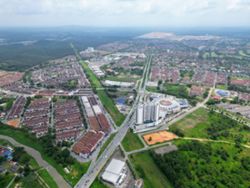
3171273
PETALING JAYA: Enforcement actions were taken against 44 illegal e-waste factories last year, says Nik Nazmi Nik Ahmad.
The Natural Resources and Environmental Sustainability Minister said eight of these factories had been shut down, while the remaining 36 are undergoing legal proceedings under the Environmental Quality Act 1974 (Act 127).
His announcement follows a series of recent clampdowns on illegal e-waste operations.
Nik Nazmi said the ministry is committed to preventing Malaysia from becoming a transit or disposal point for e-waste from developed countries.
“This is in line with the Basel Convention on the Control of Transboundary Movements of Hazardous Wastes and Their Disposal, which mandates that any transboundary movements of items scheduled for disposal, such as e-waste, must secure prior approval before transit, transhipment, import or export begins,” he said in a statement yesterday.
He also noted that the Basel Convention requires Prior Informed Consent for transboundary e-waste shipments.
On Feb 14, police raided an illegal e-waste processing syndicate operating at three factories in Johor Baru in Johor, seizing more than RM71mil worth of metal and equipment.
The following day, some 50 tonnes of bullet casings, fired bullets and live ammunition were found during a raid at an illegal e-waste processing factory, which had been operating for two years, in Kuala Langat, Selangor.
On Feb 18, another illegal e-waste processing syndicate was busted when the enforcement teams raided two factories in Pekan and Gebeng of Pahang.
Initial investigations revealed that all the e-waste came from overseas.
Global waste trade watchdog group Basel Action Network researcher Wong Pui Yi highlighted the need to recognise that much of the illegal e-waste processing industry deals with smuggled foreign e-waste.
“What Malaysia is receiving is highly difficult material to process cleanly without significant expenditure to contain the pollution,” she said.
She explained that e-waste treatment is extremely toxic and can release up to 1,000 chemical substances including brominated flame retardants and polychlorinated biphenyls.
“Leachates from facilities and dumpsites contaminate soil and water, and when the residues are burned, it severely affects the respiratory health of people living and working nearby,” she said, adding that it can lead to irreversible health effects like cancer, miscarriage, neurological brain damage and diminished IQ.
Acknowledging government efforts in tackling illegal e-waste, Wong proposed publicising prosecutions to deter criminals.
“Our penalties under the Environmental Quality Act have already been enhanced.
“Now the challenge is to apply the law,” she added.
She questioned how many people have been charged and convicted in court for these offences.
“There is insufficient information about what happens to these illegal factories and the people arrested after each raid.
“We hope that more findings can be made public,” Wong said.







































